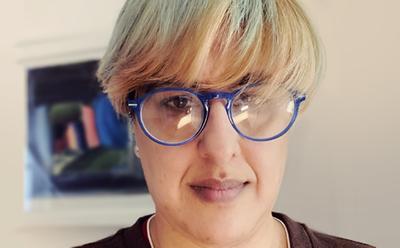Suffrage Science prize winner shares vision for equality and diversity in science

Professor Syma Khalid shared hope for a scientific future with equal opportunities and treatment for all as she was honoured at the Engineering and Physical Sciences Suffrage Science awards.
The Professor of Computational Biophysics at the University of Southampton was one of 12 UK scientists to be presented Suffrage heirlooms in an online ceremony on International Women’s Day.
Syma has developed an international reputation for her research on the dynamics of biomolecules in and around bacterial cell envelopes. She is Head of Physical Chemistry Teaching at Southampton and chair of HECBiosim, a UK consortium that allocates time on national and regional supercomputing facilities for biomolecular simulations.
Suffrage Science celebrates women in science for their scientific achievements and their ability to inspire others. The scheme’s unique concept sees current holder nominate successors who they pass their heirloom award onto every two years, creating a network of inspirational female role models. Syma was selected for the award by biological physicist Dr Sarah Harris from the University of Leeds.
Syma says: “I am surprised and utterly delighted to receive this honour. Opportunities for women in science are improving enormously at all levels and are being fostered by groups such as Suffrage Science. A lot has changed in the last 20 years, and the trends are very positive, but there is still a lot of work to be done.
“Scientists are scientists irrespective of their gender, racial background or sexual orientation. It is very encouraging to see how women are changing science, but my overwhelming hope is that we can shape a future marked with equality, diversity and inclusivity such that there is no longer any need for this award.”
In the past decade, the proportion of women in UK Core STEM occupations has nearly doubled, from 13 percent in November 2012 (WISE, 2013) to 24.5 percent in September 2020 (WISE, 2021). However, these headline statistics fall short of the ‘critical mass’ target of 30 percent, defined to be the ‘level at which a minority group of women becomes able to influence real change’ (WISE, 2020).
The virtual ceremony of the fifth Engineering and Physical Sciences awards was a joint celebration for the tenth anniversary of Suffrage Science. Host Vivienne Parry OBE, keynote speaker Professor Dame Jocelyn Bell Burnell, and panellists Dr Kat Arney, Dr Mercy Badu and Professor Melinda Duer, all explored their vision for ‘the next ten years’ of women changing science.
Syma was appointed as an RCUK fellow in Chemistry at Southampton in 2007 and promoted to full professor in 2016. She has around 15 years of experience in the development and application of molecular dynamics simulations for the study of biological molecules. Starting her own group, she noticed that molecular models of bacterial membranes were usually missing key biochemical details, such as lipid type and macromolecular crowding, and has worked to address this ever since.
Dr Sarah Harris says: “I have chosen Syma because her computer simulations are massive, they always aspire towards biological complexity, and are frankly jaw-droppingly awesome to watch. I also want to thank Syma for being such an amazing community builder. She achieves this by making things fun to do, which brings us all together. It is in Syma’s nature to put the needs of our community before her own, and she is compelled to emphasise the contribution made by her students and colleagues to her many successful projects.”
Syma has authored over 80 peer-reviewed papers and six book chapters. She serves on the management group that leads the Collaborative Computational Project for Biomolecular Simulation (CCPBiosim) as well as the management committee of the British Biophysical Society and she is the chair of the advisory panel for the Informatics and Artificial Intelligence Theme of the Rosalind Franklin Institute.
Earlier this year, Syma was part of an international team of researchers that were honoured for successfully simulating the behaviour and vulnerabilities of a coronavirus in a first-of-its-kind feat in high performance computing. The group were awarded the Gordon Bell Special Prize for High Performance Computing-Based COVID-19 Research by the Association for Computing Machinery (ACM).
To further commemorate the tenth anniversary of Suffrage Science, the MRC London Institute of Medical Sciences has launched ‘The Suffrage Science Podcast: How women are changing science’, hosted by Dr Kat Arney. Episodes are being released on Apple Podcasts, Amazon, Google, Spotify, or wherever you get your podcasts.